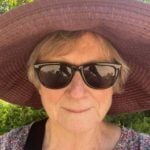Gardens are made of memory: of people, places, plants and all that nature offers us in such bounty that we do our best to hold it close in our personal spaces.

This September, as I look out on my start-up prairie, formerly known as the front lawn, I remember a person who had more impact on me than she might have realized at the time. Laurie Otto, the leading light of the ‘Wild Ones’, a woman at the forefront of the natural landscaping movement, who gave me a day of her time nearly 20 years ago to show me around some of the native gardens taking shape in Wisconsin, inspired by her work.
I was visiting Milwaukee, returning to my birthplace after thirty years living and gardening in England. My planting approach then was very much Gertrude Jekyll meets a writer with big dreams and a small bank account. I knew that there had to be another way forward once I was back in the States. Laurie showed me the path.
Laurie was a farmer’s daughter, and as the granddaughter of a farmer I can attest that as such, you have a genetic quirk that gives you a special understanding and respect for the rhyme and reason of the seasons. Perhaps that’s why Laurie began to notice there were fewer robins darting through the trees and hedges of Wisconsin’s farmland, yet many could be found in their death throes by the roadside. At the time, in the early 1960s, DDT was literally being hosed on the landscape to control elm blight and mosquitoes. It was a Pandora’s Box; an insecticide widely used during WW2 was being turned on the home front. She described how it was slowly realized DDT was climbing the food chain, and that its banning became an uphill battle waged between those tiresome old “bird-lovers” and state legislators. But in the end her activism, combined with support of the scientific community and donations from people across the USA, won out. DDT was banned in 1972.

As Laurie drove me around the streets and lanes, stopping here and there to tour a Wild Ones’ gardens, I saw how nature was given its head, how fallen birch logs were discreetly positioned to indicate a path, that shrubs were left untrimmed to provide winter fodder and shelter, and lawns had been replaced by wildflower meadows, and were now going to seed in the late summer sun. The scales fell from my eyes: English borders were not to be part of my new Austin, Texas garden (where the only thing in the yard when we arrived, besides fire ants and weeds, was a dead possum in the woodpile. Seriously! What was that smell?). When I got home, the first thing I did was sign up as a volunteer at the Ladybird Johnson Wildflower Center, as it was called back in the early 2000s. Ladybird’s believed that the identity of place rested in the native flora, which if allowed to flourish would rehabilitate degraded environments and support the rest of the indigenous biota.
That day in Wisconsin, I interviewed Laurie about her work introducing prairie planting schemes at local schools; the annual burn was a bit of a worry because the gardens were generally close to the school buildings, but there were work-arounds, supportive parents and teachers–and cooperative fire services who enjoyed supervising the action.

Yet, despite her success, speaking candidly, she admitted to having moments of doubt about what the future held, but believed that there were “wild ones” everywhere, and as long as they continued to care passionately and to work untiringly, even in their own small gardens, so nature would prevail. Looking through my slides, taken that day as evening drew in, is a rather blurry one of a marker inscribed:
“Don’t you remember? That’s what roadsides once looked like. Laurie Otto.”
I do remember, and so do you, I’ll bet.
©Text and photos Ethne Clarke 2019.
To read more about Laurie Otto, see this article by Ney Tait Fraser here https://www.birdwatchingdaily.com/beginners/bird-friendly-yards/lorrie-otto-and-the-fight-to-ban-ddt/
Fraser’s book, Mending the Earth in Milwaukee, describes 16 gardens that went back to nature. Self-published, it is available at https://www.amazon.com/Mending-Earth-Milwaukee-Tait-Fraser/dp/B073ZMLRRJ/
For information about joining your local Wild Ones group, visit https://wildones.org/
You can also learn more about their Lorrie Otto Seeds for Education (SFE) grant program at https://wildones.org/seeds-for-education/seeds-for-education-grant-nursery-partners/










